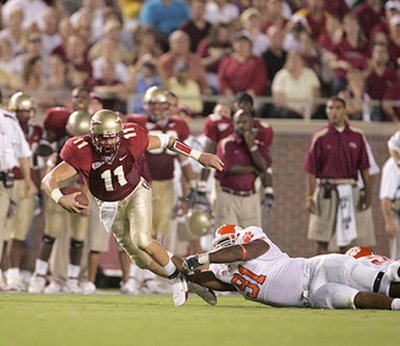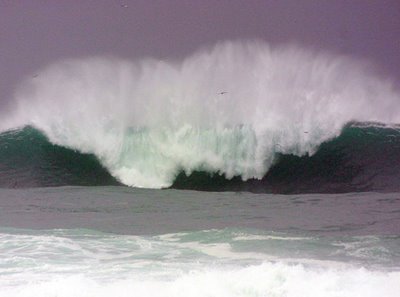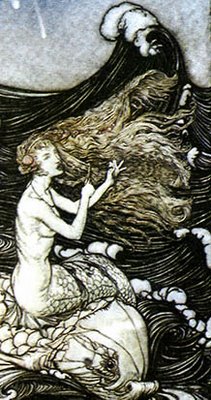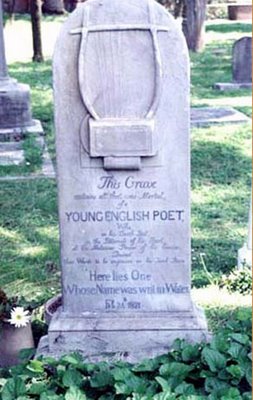The Solace of Wet Things

Two events that flowed beneath the tide of this weekend, this year at least: Michaelmas and a more personally bittersweet anniversary. One paeans Manannan’s sound in the swash of St. Michael’s bones, the other the salt cathedral which arose when a deeply-wakened love walked away, on a September 15 now 25 years ago. (That date is also the anniversary of Bill Evans’ death, a jazz pianist whose heart-sounds- and washes- were sweeter and deeper than any thing I’ve heard lifted from the throat of song; he died on the same date my love gave up her ghost.)
Wha happened? A hot weekend in a slowly changing September -- early and late in the day there’s a sweet semblance of autumn, breezes from afar, a slowly shrinking center of the day, still large, summer-hot ... Yard-chores on Saturday (pruning back bushes, transplanting cat’s whiskers into the bare island, mowing, edging, blowing), watching college football & reading Jackson Bate’s biography of Keats while my wife, too weak from the Day Two of a muthah of a headache, ironed a mountain of linens to go into her end-of-business sale.
The sum: Louisville beats Miami (yay), Florida State loses to Clemson (boo hoo), money’s tighter ‘n’ a parson’s bung and there’s weariness aplenty in this house, our tenth wedding anniversary on the horizon asking us just what we have done all these years, is this enough, what happened to our youth, just what do we make of this shrill and shrinking world: I question all of this writing in some essential way similar to the way my wife gives up the ghost of her dream, all these sea-wide words washing bonelessly on shores no one will ever care about, no one except a curved phantom who lives inside the conch Manannan washed up in my ear, she who whispers Come and More and Say It Say It Now. That rigorous call to a vastly vapid task. Who am I kidding?
Thank God for consolations -- the ease of our house, the beauty of the garden just outside (big butterflies awhirl in the blossoms, the frail bending stalks of green, the whole of it like a softly lifting heart), cats everywhere demanding love and food and providing buckets of comic relief, pizza Margherita (my wife loves the way I make it) and the BBC version of “The Office” on DVD while the day outside spoors down from blue to gold to black and the sprinklers work the garden in a pianissimo glissading surf, black heads sursurrating the solace of wet things.
***
A wet sound, yes. (Joseph) Severn, speaking of Keat’s absorption in whatever he saw, was especially struck by his delight in the billowing grain as the wind moved across it; as they walked, Keats
“would suddenly become taciturn, not because he was tired, not even because his mind was suddenly wrought to some bewitching vision, but from a profound disquiet which he could not or would not explain.
“The only thing that would bring Keats out of one of his fits of seeming gloomful reverie ... was the motion of the ‘inland sea’ he loved so well, particularly the violent passage of wind across a field of barley. ... He would stand, leaning forward, listening intently, watching with a bright serene look in his eyes and sometimes with a slight smile, the tumultuous passages of the wind above the grain. the sea, or though-compelling images of the sea, always seemed to restore him to a happy calm.”
-- In Bates, John Keats, 194-5

Indeed. The bells of Michealmas and Sept. 15 -- ground zero of my awakened heart -- ring deeply undersea, so much inside my words that I write to their ruddering, beneath the broad blue sails ....
***
“Jouissance of the Other is not the sign of love. And here I am saying that love is a sign. Does love consist in the fact that what appears is but the sign?
“What is not a sign of love is jouissance of the Other, jouissance of the other sex and, as I have said, of the body that symbolizes it.
“A change of discourses -- things budge, things traverse you, things traverse us, things are traversed ... and no one notices the change ... The notion of discourse should be taken as a social link, founded on language, and thus seems not unrelated to what is specified in linguistics as grammar.
“If one considers everything that, given the definition of language, follows regarding the foundation of the subject -- so thoroughly reviewed and subverted by Freud that it is on that basis that everything he claimed to be unconscious can be grounded, then one must ... forge another word. I call it linquistricks.
-- Jacques Lacan, “To Jakobsen,” in On Feminine Sexuality, The Limits of Love and Knowledge 1972-3, Book XX of the Seminars of Jacques Lacan, ed. Jacques Alain Miller, transl. w/ notes by Bruce Fink

I ALWAYS GET IT WRONG
Sept. 15
I always get it wrong,
trying to make you love
me by making myself look
the way you wow me.
Instead of wooing opposites
I’ve always had a jones
for sames, blonde to blonde,
lots of flesh both ways,
tight clothes revealing
my surficial bulge the
way your bra and
panties flaunt all
they must conceal,
as if in my swells
and ripples I somehow
proferred to you
your own swart nipples.
I thought looks were
the compass of true love,
a woman’s thrall of
me in bedded thrash
the purest dram
of that blue sea which
which salts God’s
ecstasy. And in my
spring-to-early-
summer years that
seemed true; the
women I danced and
mated with sure seemed
to find delight exactly
as I dreamed, our nubile
surfaces a sheen and
wild, our eyes reflecting
back an orchid’s fire,
drinking deep the
fragrant booze of red desire.
But always eventually
as day broke us
back in two the other
words emerged, words
which seemed to tower
up from seas, like cliffs
renouncing all the
talk which brought
us to a crescendo there.
I mean love, that whole
deep question which
sex precedes and
sometimes breeds,
where a body’s welcome
begs to ask if hearts
do too, and if they do
just what two souls
can marry to one life.
Those next words
had nothing to do
with blue appearance
and derangement:
forget the cockledoodle’s
hoo when there’s work
today to do, bills to
pay and weary remits
to the weal of living
at eye-level. Such hard
realities embolden love,
casting two hearts in
a tough old bronze
which ring so true and
loudly in the night
as to make one wonder
just what all the
earlier fuss was all about,
as if the torrid hours
were a dream, a wet
one surely, but no more
than lubrication of
a door that got
two people to the shore
where all things at last begin.
OK -- All true -- yet
the persistence of that
first thrall in this dark-houred
inkhorn is so thick
and rich (not to mention
evalucent) as to keep
me perpetual in the writing
of its writhe -- Oh blue
rapture of seas raked by
a naked moon’s passing
rear! -- If only here,
these daily captures keep
that first song fresh
and awash in my ear.
Hard learning in the
topside world has tutored
me to seek my nubiles
only here, between safe
margins, sans dementia
of that third dimension
which triangulated
rumpy rears with
sears & dears. Thus
I clear the reefs of
the actual Thou
to sail Your pantyless
pink main, ball-deep
inside a twisting wave
exultant in your sighs
which plead my ever
drop of burning ink
whaled from the bottom
of all seas. Back here
across the language
before love conquered
all, we’re back at
work at first great
things, my years
down like pants around
my ankles and you
standing proud with
skirt uplifted & knickers
down & smiling, smiling,
smiling, with your eyes
shut fast on me: O nude
transcription of the song
whose words are lost
on me, whose cost is
measured out in all
we toss away trying
to get back to the
firstness of it all
before we called it love.
Maybe I always had
it right, only in reverse,
our nakedness the
outward sign of
discretion at its worse,
propriety spanked into
us & abandoned in
the purer light of
angels, the airier
lust of sawhorses
riding dry and
drier waves. a
puerile rowdiness
for sure, oily at my
age, a rage for
disorder’s plunge
and plunder kept to
pages whose ruination
is my sole business
and perpetual delight
so many years after
love sent you packing
into the billows of first light.
But then—mon dieu!
even my verses seem
doomed for wooing you
the way I think youdream,
singsong nonsense where
clear and specific things
might have caught your
eye, nailed you in my heart.
Poor fool me, then,
at it wrong again,
joyous in those metres
which swamp
the bed we’re in.
***
“‘The Genius of Poetry must work out its own salvation in a man: It cannot be matured by law & precept, but by sensation and watchfulness -- that which is creative must create itself.’ By this leap ‘headlong into the Sea,’ he had learned at first hand ‘the soundings, the quicksands, & the rocks,’ and knew them in a way he could never have done if he had ‘stayed upon the green shore, and piped a silly pipe, and took tea & comfortable advice.”
-- Jackson Bates, John Keats, 232, quote from Keats is from Letters 1.374

THE CHILDREN OF WATER
Fiona Macleod
(Collected Works, Volume V)
O hide the bitter gifts of our lord Poseidon
—Archolochus of Paros
… Long ago, when Manannan, the god of wind and sea, offspring of Lir, the Oceanos of the Gael, lay once by weedy shores, he heard a man and a woman talking. The woman was a woman of the sea, and some say that she was a seal: but that is no matter, for it was in the time when the divine race and the human race and the soulless race and the dumb races that are near to man were all one race. And Manannan heard the man say: "I will give you love and home and peace." The sea-woman listened to that, and said: "And I will bring you the homelessness of the sea, and the peace of the restless wave, and love like the wandering wind." At that the man chided her and said she could be no woman, though she had his love. She laughed, and slid into green water. Then Manannan took the shape of a youth, and appeared to the man. "You are a strange love for a seawoman," he said: "and why do you go putting your earth-heart to her sea-heart?" The man said he did not know, but that he had no pleasure in looking at women who were all the same. At that Manannan laughed a low laugh. "Go back," he said, and take one you'll meet singing on the heather. She's white and fair. But because of your lost love in the water, I'll give you a gift." And with that Manannan took a wave of the sea and threw it into the man's heart. He went back, and wedded, and, when his hour came, he died. But he, and the children he had, and all the unnumbered clan that came of them, knew by day and by night a love that was tameless and changeable as the wandering wind, and a longing that was unquiet as the restless wave, and the homelessness of the sea. And that is why they are called the Sliochd-na-mara, the clan of the waters, or the Treud-na-thonn, the tribe of the sea-wave.
And of that clan are some who have turned their longing after the wind and wave of the mind--the wind that would overtake the waves of thought and dream, and gather them and lift them into clouds of beauty drifting in the blue glens of the sky.
How are these ever to be satisfied, children of water?
THE NAKED TRUTH
Sept. 15, 2004
Marcus, a student of the gnostic
Velentinus (c. 150), relates that
a vision “descended upon him ..
in the form of a woman ... and
expounded to him alone its own
nature, and the origin of things, which
it had never revealed to anyone,
divine or human.”
-- Eileen Pagels, The Gnostic Gospels
She appeared at the upper bar
out of nowhere, fanning through
the smoke and blaring rock
as if stepping from that wave
ordained to drown me with
every blue fury in the lap
and chest of Love. We talked
a while nursing beers in
the wild din, her voice and
mine forming a bower
in which some goddess awoke,
aroused, and laid hands
on us, ushering us into woods
to sacred for a name.
And left us there, in
reverence for a secret
only we could reveal
and revel when all
our clothes fell like
angels to the floor.
Much later that night --
in fact well into the
next morning’s too-
bright hot summer light --
She smiled unbuttoning
her tropic blue blouse,
and unhooked her bra with
that hidden gesture,
freeing her full, pink-
nippled breasts, startling
me more awake than
I had ever been: And with
eyes locked on mine
came close, to softly
weave her chest against
mine, whispering O
make love to me. O
indeed: And so I did,
a half dozen times or
more that too-late-night
which had crashed
so dreamily on the next
day’s shore, licking her
to sweet moans once
then twice, getting sucked
off, fucking slow and
long in rhythmus
to a secret beat
which was new even
to God. We could not
stop entering and
collapsing in each
other, leaving selves
and hours far behind;
thus we drifted
so far offshore as to
never quite return.
Ever. But as a
mortal pair we fared
quite poorly, and in
weeks she jilted
the needy, greedy,
angst-ridden boy
I had become, walking
back into the night
for good. After all
these years, I mark
this day -- Sept. 15 --
as the tolling of
her wavelike recede
from the ecstasy of
my life, my feet forever
thence half in a surf
which once proclaimed
our naked name. Fare
thee well, lost lover.
The child you said you
begged of my seed
our second night
would now be 23,
and perhaps he
or she is here,
cuculattus of that
high blue wave
which crests in every
“Yes!” God gives
me truth to shout.
Whenever I hear those
old Journey songs
from 1982, I go back
to that first unveiling
hour, in thrall
and surrender to
the whole fantasy
of love and lust,
believing it more
than Truth itself. That
fictive beach where she
and I came hard
calling each other’s name
remains here, built
up with the ground
bones of every other
love I’ve sung,
sustained now by
the long, perhaps
my life’s remaining
duration with the woman
I call my wife by
day and blue welling
deep down the
pike of night.
Our hearts are
more naked now
than our bodies
may be allowed to
go: Mere angels
can’t fly this naked reach
which is part dream,
part ocean beach,
part clear blue sky
inside you and I.
***
waves
1981
waves
carry me carry you
to this beach
so frightened
to be so close
to be so completely here with you
the mist is thick around us
I cannot say how I got here
or remember where I came from
it no longer exists
to touch you
our skin skittish as colts
in a storm
and pass through with you
to a place that has no name
that terrible place of rest
between firmaments
where we become one
and sink there
then wake walking on this grey beach,
home at last,
hearing only the crash
of things forgotten long ago:
waves...
waves ...
waves...

in losing
1981
In losing there is the coming of night.
Waves recede, revealing
The heart’s flapping fish.
In losing slow jazz plays on and on,
Spinning around a spike on a record.
The cut is clean and deep.
In losing the peg is yanked out,
And the wound gets raw,
Washed with a spillage of sewage and brine.
Eventually, riderless horses appear
With wild manes coursing in the wind,
Their cold eyes asking,
Shall we take you home?
You must decide how much there is
In losing.

DEEP WAVE RIDER
2006
Deep waves stroll the oceans
unseen to all surfaces
on the cold wings of abyss,
a visceral tow glowing
with the gules of minerals
torn from the paps of hell.
He rides those waves too,
my fish-familiar, in this
songlike totem I ride here,
his salty ancient brogue
still rich on my tongue
after a thousand mortal
spans. I on a fish which
masts deep waves is
what makes the music
so hugely dark, opaque
and fell, a buckaroo’s derange
in Moby’s wake
where shattered hulks
and eerie churchbells
fan by too fast and dim
to hearken, much less name,
and life is pure Silurian,
a swarm of sharks and jellyfish
and trilobites about the
same matins now for a half
billion years. That infernal choir
lifts the base note I here sound,
my vox humana the highest
ache of jism and jawing
egg, the hot rush of futurity
which forever lives the
next day with ravenous teeth
in a gale of sweet-torn flesh.
Just what song is it, I
wonder, rolling three miles
beneath my saddle? What
beast of lyric hooves so wild
and regal blue as to make all
depths divine, be they in
my words or in the sea or in
the angel’s fall between
us who limns the barrows
of all lost gods. From trough
to crest I clasp my knees
to waves as tall as Pyranees
yet never crash on shores
my love will ever see,
as if love’s shout of pure
liquidity was never meant
for beds or beaches or
the dry breeches of songs
about love, rather than
the ones all depths love.
Primal as to drown
the dreams of shamans
etched on walls not seen
in ten thousand years,
this music is old, it was
lifted pure up to God
when men and beasts
were one, brother and
familiar, both in the
maw of appetite and
the stellar foam of lust,
both in the other so
vastly that whole
caverns failed to harrow
the rituals of rebirth
into the womb which
birthed us all.
Perhaps that’s why
I’m here on the biggest
waves no human eyes
can see, yeehawing
to high heaven on
thalassas of brine joy,
lurching and lifting
up to crown Manannan’s
thrall, wilding all the
way down here where
Uranos parked his balls
in a mess of Venusian
cream. When I’m on my
beast we lord the waves
which rock and roll the seas --
the boy astride his guitar
of a cock of fish of a pen,
come at last to gig
the big night music,
power--chording deep
waves like shouts of
whales between beneath
and past all shores.
WAVE SAVIOR
2004
If a man holds this to be foolishness,
he knows nothing of love and how it lives.
-- Rimbaut d’Orange (c 1175 AD),
transl. Jack Lindsay
... And in my spirit, which for so long by then
had not been left hopelessly undone
with awe and trembling in her presence
without more knowledge from the eyes, by
an unseen force that was coming from her,
felt the old love in its great power.
-- Dante Purgatorio XXX 34-9
transl. W.S. Merwin
Just one slap of that salt blue
wave which came from somewhere
behind her sweet kiss
and I was that foolish child
again on the beach, reborn
between my mother’s voice
and the sea’s. How much
tilled thought and willed belief
just vanished in that
baptismal sigh in which
I came in her then
ebbed to a clear blue
infintie space which
wrote over the whole text?
Years of hard study learning
all the greater names, that
slow attenuation of
nuancing numens held
by a greater net of words—gone,
my lips ababble with “duh” and
“dear,” my grin pure votive
of fool’s gold. One wave
drowned every dorm and
library I had in
solitude long marrowed,
& rose merrymost in the
old gothic church til
it bumped against the
window nexts to God
and snatched heaven
back to earth. Squishy
sounds of honeyed
light fill the hundred bedded
cells which limn my memory,
all those lovers and my love
pouring out the altared juice
which reels a secret cinema
inside each day’s picture show,
my ever-newing, salt and sacred
blasphemy. Love’s shore-
washing faith beheaded
every known with just one
fateful kiss too many years ago
and made me minstrel
with a foolscapped pen
atop the crashing wave
that drowns the world
and leaves behind
an ebbing, gentle hiss,
your wordles bliss.
May I sing merry and anon
to the primrose end of this.


<< Home